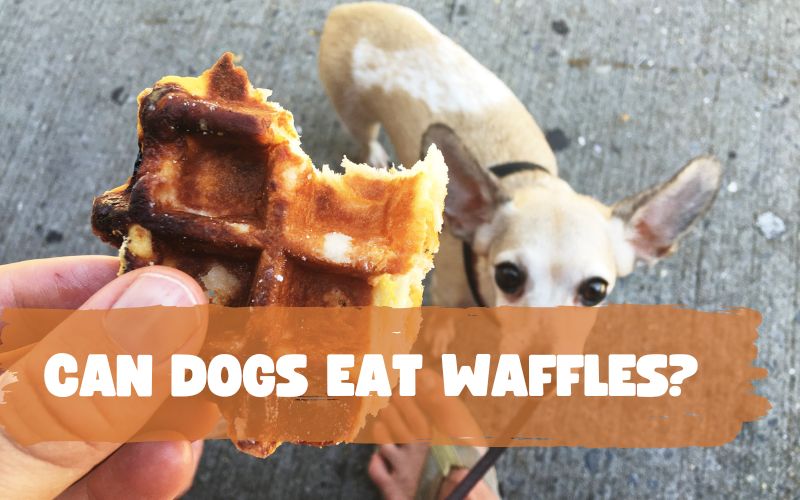Have you ever found your pup looking longingly at your breakfast, particularly when you’re enjoying a delicious waffle? If so, you’ve probably wondered whether sharing your meal with them is safe.
Dogs can eat plain waffles made with non-toxic ingredients in small portions. But as a dog owner, learning more further specific information about how your beloved dogs can eat waffles safely and well-being is a must.
This article provides an in-depth examination of the potential risks and benefits associated with dogs eating waffles.
Curious if your lovely dogs can join in on your Sunday brunch. You’ll find out soon!
Key Takeaways
- Dogs can safely eat plain waffles made with non-toxic ingredients in moderation. Still, avoiding toppings containing sugar, fat, or potential toxins, like chocolate chips or xylitol, is essential.
- Feeding waffles to dogs can lead to weight gain and obesity due to the high amount of oil and butter in most recipes. Obese dogs are at risk for health problems such as diabetes, arthritis, heart disease, and a decreased life expectancy.
- It is best to offer healthier dog alternatives, such as chaffless (cheese egg waffles) or fresh fruits and vegetables without toxic substances. These options provide essential nutrients while avoiding harmful ingredients in traditional waffle toppings. Always consult a veterinarian before introducing new foods into your dog’s diet.
Can Dogs Safely Eat Waffles?
Although waffles may seem like a decadent treat for your furry friend, they should be carefully given. Dogs can safely consume homemade waffles in moderation if the ingredients are non-toxic and served plain.
This means avoiding decorative toppings that might contain high levels of sugar or fat, such as honey and syrup. The primary elements used to make a basic waffle – flour, eggs, milk, sugar, salt, baking powder, and oil – are generally okay for dogs’ consumption in small quantities.
However, it’s crucial to ensure no toxic ingredients like chocolate chips, or xylitol have been added to the mix. Gluten-free options made with dog-friendly constituents, such as Amaranth flour, can also be offered sparingly.
While a bite here and there will likely not lead to any complications if your canine companion accidentally gets a piece of your breakfast delicacy, it’s essential to avoid turning this exceptional indulgence into a daily tradition.
Overfeeding items high in carbohydrates or fats could lead to weight problems and obesity, among other issues, over time. Therefore always exercise control when feeding dogs human food, including waffles.
Potential Risks of Feeding Waffles to Dogs
Feeding waffles to your beloved pet can lead to several health problems, one of them being weight gain. This is primarily due to the high amounts of oil and butter present in most waffle recipes, ingredients that aren’t part of a dog’s natural diet.
Regular intake of these fatty substances adds up quickly on the scale. It might also contribute to obesity which puts dogs at risk for diabetes, arthritis, heart disease, and decreased life expectancy.
Another concern lies with what goes on top or inside the waffles. While humans indulge in sugary delights like maple syrup or chocolate chips, these toppings are harmful—even potentially lethal—to dogs.
Xylitol, an artificial sweetener commonly found in sugar-free syrups and other foods meant for human consumption, is toxic for dogs, even in small quantities. If ingested by your furry friend, it could cause a sudden insulin release, resulting in hypoglycemia (low blood sugar).
Symptoms include vomiting, loss of coordination, or seizures within mere minutes after ingestion; if untreated, it may result in coma or death. Equally hazardous is chocolate, often used as a topping or ingredient in particular types of waffles due to its component called Theobromine, sourced from cacao beans.
It’s quickly processed by humans but not by our canine companions, leading to symptoms ranging from diarrhea and panting up to bloody urine or irregular heartbeat, which would require immediate veterinary attention upon notice.
Healthier Alternatives for Dogs to Enjoy
As a diligent dog owner, one would love to treat their furry friend with delicious tidbits. However, waffles and other table scraps often don’t meet the nutritional needs of dogs and could potentially cause harm.
It’s essential to be cautious about their diet and consider healthier alternatives that are both safe for consumption and beneficial regarding nutritional content.
Dogs thrive on a balanced diet of protein, vitamins, minerals, healthy fats, and carbohydrates. A great alternative to waffles is chaffles — cheese egg waffles famous within the Keto community for being low-carb and grain-free — which combine nutritious ingredients like eggs and cheese.
These provide essential proteins without any sugar or salt.
Of course, not all dogs can stomach dairy products due to lactose intolerance causing stomach upset or diarrhea; hence it’s crucial to exercise caution while introducing new food into your pet’s daily routine.
Fresh fruits and vegetables such as apples (without seeds), carrots, or sweet potatoes can also prove fantastic substitutes as treats due to their high nutrient content, but be sure they don’t have any toxic substances like garlic powder or onion powder mixed in!
For those occasional special treats when you feel compelled towards human-like foods for your pets – opt for gluten-free pancakes topped with pure maple syrup instead of traditional fatty, sugary toppings full of harmful sugar alcohols like xylitol.
Nothing replaces a hearty diet tailored to canine dietary requirements, so always consult with veterinary medicine experts before making significant changes.
Conclusion
Dogs can technically eat plain waffles in small amounts as an occasional treat. Still, it is not recommended due to the potential risks of certain ingredients and toppings.
Chocolate chips, sugary syrups, and xylitol-containing products should be avoided at all costs. Instead, choose healthier alternatives like homemade chaffles or dog-friendly treats specifically formulated to meet their nutritional needs.
Always consult your veterinarian before introducing new foods into your dog’s diet. Remember, their well-being is always the top priority!
